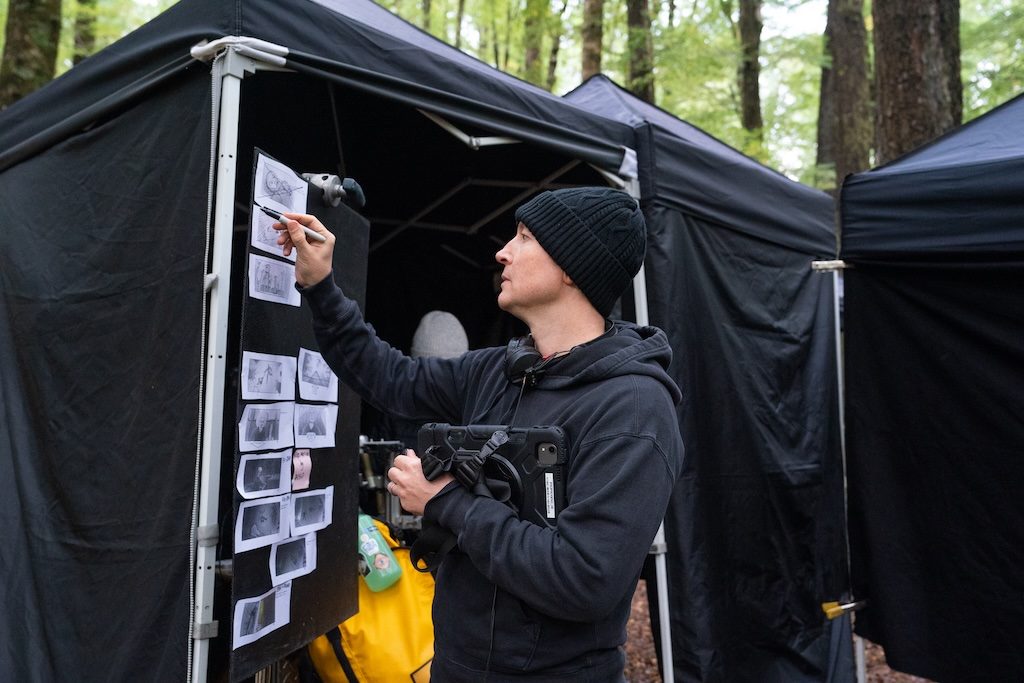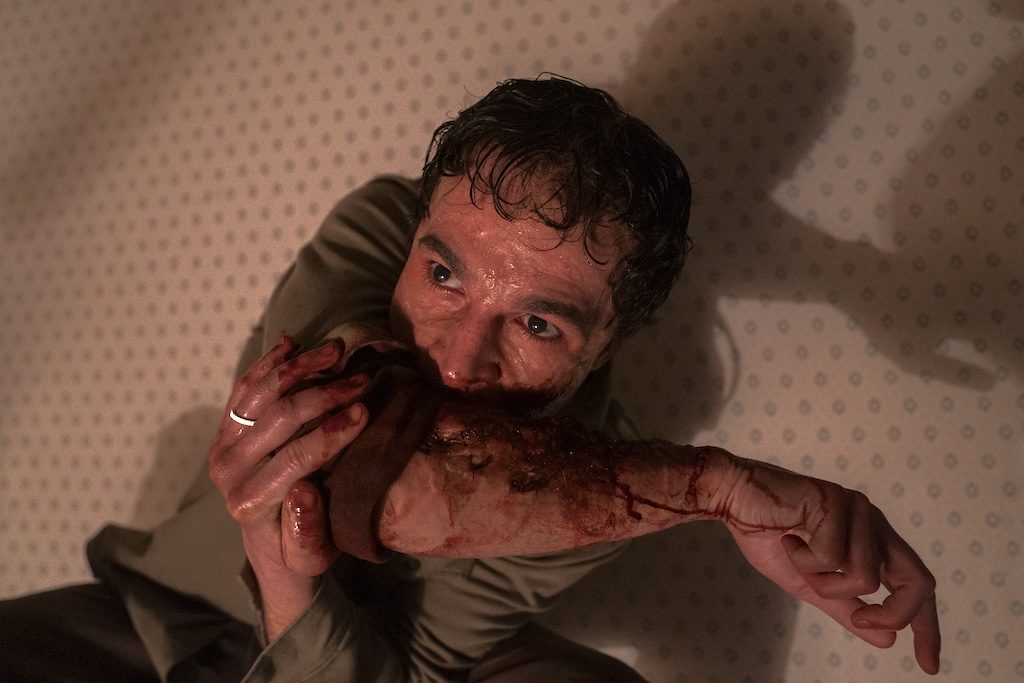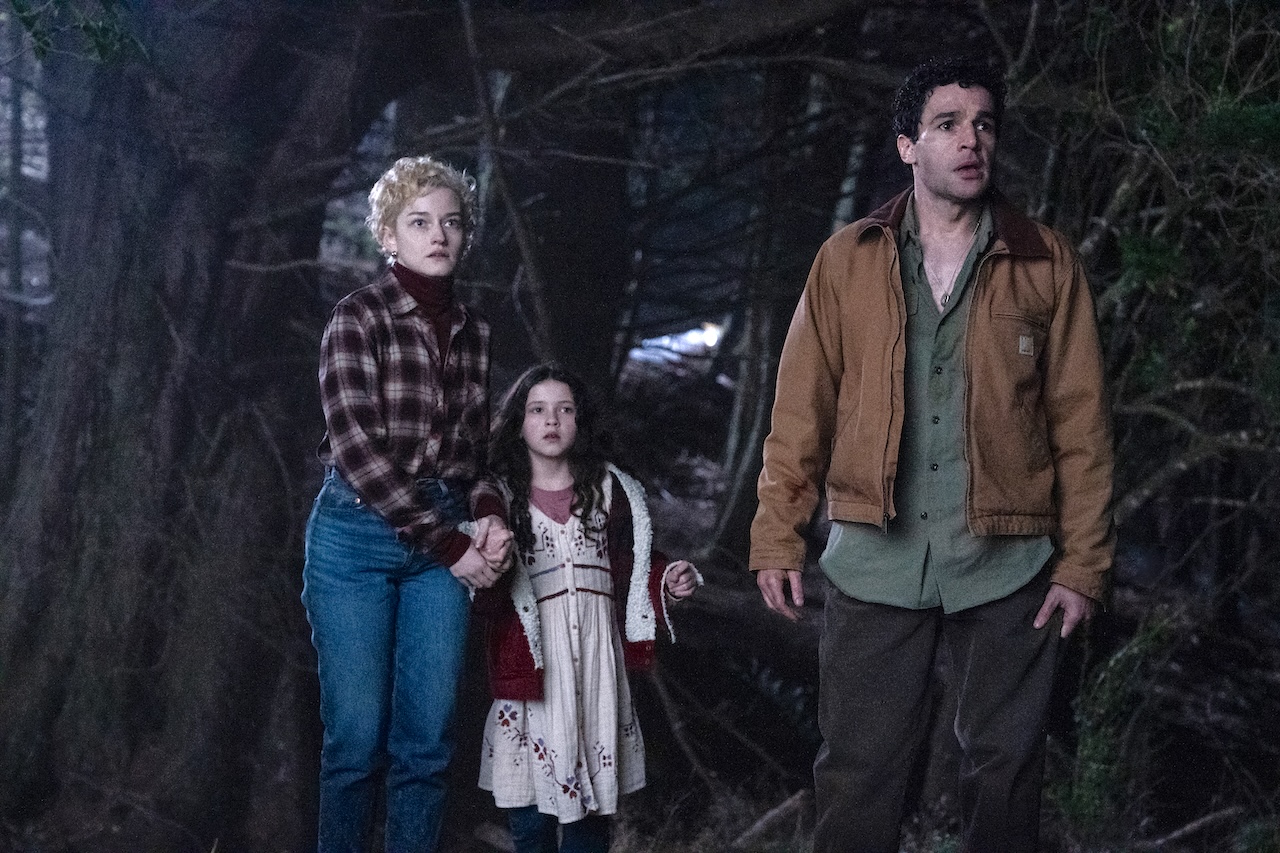It’s a fresh take on a classic monster… but unlike most horror movies, this one might leave you wanting to call your dad afterwards.
Wolf Man, starring Christopher Abbott, Julia Garner and Matilda Firth, tells the story of Blake Lovell (Abbott) who takes his wife Charlotte (Garner) and daughter Ginger (Firth) to the old family farmhouse to collect the belongings of his father, who, missing for years, is finally declared deceased. Isolated in the middle of nowhere and stalked by a vicious animal on their arrival, the horrors outside the home are soon paralleled by those inside, as Blake, seemingly infected by a virus, begins to transform into something inhuman and terrifying.
The film was almost ten years in the making; Universal Pictures had long wanted a reboot of the 1941 classic The Wolf Man but it had to be done just right. 2020’s The Invisible Man gave them the name they wanted attached to it – Leigh Whannell. With a long career in horror, most notably in the creation of the Saw and Insidious franchises, it was Whannell’s interpretation of the classic H.G. Wells story and 1933 film of the same name that made him the choice to helm this particular project. Directed by Whannell and written by both Whannell and his wife, Corbett Tuck, the film is produced by Jason Blum and Ryan Gosling. I spoke with Whannell who, despite some initial trepidation when first presented with the idea of making the film, is now enthusiastic about the end result, saying, “A lot of work went into this movie… My heart is definitely in it.”
Tell me about the history of this project and how you became involved.
Universal was really happy with The Invisible Man…which made me really happy. They approached me pretty quickly after the film’s release and asked me about Wolf Man. I remember thinking at first that maybe it wasn’t the right thing to do a monster movie because I had just done one. And then, just as an exercise, I started thinking about what my approach would be if I were to do it. I came up with an idea of shifting perspectives and fell in love with it. Wolf Man is a really great comic character – that doesn’t necessarily mean I’m going to have the energy to do a film about him. But what hooked me in was this idea of presenting a wolf man transformation in a new way.

Leigh Whannell on the set of Wolf Man
This particular character is already unique in that there is no literary source as there is for, say, Dracula or Frankenstein’s monster. How did you approach any research and what were some of the sources you pulled from to create your version of Wolf Man?
I pulled from a lot of real life actually. It was less about other stories as it was about things like illnesses, diseases… even personal stuff. Friends of mine were suffering from degenerative illnesses, and I had one friend in particular who was struggling with ALS. It was horrifying to watch and it makes you so sad that you want to put that sadness somewhere. That’s really what I was researching and drawing upon.
What were some of the challenges you encountered while making this film? What did you enjoy about it?
The challenges were all things I created for myself in writing the screenplay. I didn’t realize as a screenwriter how hard I had made life for myself as a director. I was only focused on writing a good screenplay. My wife Corbett and I were writing the film together, and our big focus was on just making a compelling movie.
And then I got on set and started getting into the practicalities of shooting and realized just how difficult it was – having a child in there, having mostly night shoots in an isolated setting… it’s all one set. The lead actor has to be in makeup for hours and hours. It was extremely challenging, this logistical puzzle that had to be solved. Even the first AD would constantly remind me that I did this to myself.
So that was the biggest challenge, but the most gratifying part of it was trying something new. I loved shooting all the perspective changes and giving the key creatives on the movie – the cinematographer, the production designer, and the sound designers – a unique challenge, making them think about something different.
A story is a story. That’s not to say that every movie has to have some unique cinematic gimmick to keep it going; you just get good actors with a good script, point a camera at them, get it in focus and you’re there. That’s a great movie. But there’s something about me on a set – I like to challenge people and come up with things that push them. So that was the best part.
How did you prepare your cast and crew for this film?
With Chris (Abbott), we just had a lot of conversations really. He’s a pretty instinctive actor and he doesn’t like to overthink things. He prepares, but he wasn’t too keen to show me everything because he really wants to give everything to the camera and the moment you’re rolling.
With Julia (Garner), her role in the film is so emotional and she just wanted to feel that raw emotion; she would get herself into this state when she was shooting. Again, like Chris, she saved it all for the camera. Some actors want to do homework. Both of these lead actors were people that just wanted to save it all for “Action”.
Let’s talk about your use of time in the film. Everything takes place over the course of one night, which seems short in terms of narrative on one hand, but drawn out for a character’s transformation on another. Can you speak to the pace of this story?
I decided pretty early on that I wanted it to be two competing elements. First, I wanted to drag out the transformation. But second of all, I wanted to have the story unfold at this breakneck pace over the course of one night. Corbett and I were both determined the film should feel very contained and immediate, and it was that immediacy that attracted us to it.
On one side we were slowing things down and on the other side, we were speeding them up so that the two were competing states. It was that way from the first draft really, and we kept that immediacy going. It just felt natural to make this movie at that pace.

Blake (Christopher Abbott) Photo courtesy of Universal Studios
There’s a strong thematic focus on family, particularly fatherhood. Tell me about that and any other themes you explore.
The thematic conversation about this movie is interesting. Some movies present themselves as being clearly about one thing – certainly with The Invisible Man and Upgrade, those two movies seemed to be talking about one thing that was their North Star.
With Upgrade, I was talking about technology and this great replacement that we’re engineering for ourselves as human beings with AI. We seem to be in a race to get that done and that was on my mind. The Invisible Man was about gaslighting and abuse in a relationship. Wolf Man was written during COVID – it was an uncertain time and, like everyone else, I was very scattered. I was living at home, I had kids, I think I was in sweatpants for a year. Everybody was telling that same story during COVID.
So Corbett and I poured a lot of that into the movie and we weren’t censoring ourselves by trying to make it about one thing. I don’t know if that makes the film more difficult to read. But it felt like it was about a lot of different things. How clearly or concisely we’ve talked about these things, I’m not sure; but definitely, fatherhood and parenting and all of those things were our lives during that time because we had three very young children in the house all day long for a whole year. It was not an easy time.
Tell me about writing with your wife and what your creative process was like.
It was good! I wasn’t sure how it was going to be, but it turned out great.
Corbett would sit upstairs and I’d be down in my office and we would text back and forth in the same house. We would usually take different scenes and we would compare notes afterwards. She would punch up my stuff and add her little flourishes to the dialogue, and I would add little flourishes to hers and we would go back and forth. Of course, there were those moments – on both sides – when one of us would say, “Oh, you took out that line… I love that line.”
So it was interesting. Writing a screenplay can be tough on a relationship. I haven’t written many films with other people, but I’ve definitely seen firsthand how relationships – even friendships – can suffer. It’s dangerous to work with someone who’s a friend first. Now if you make a friend during a creative process, then that’s great – but I think you need to be careful with friendships in the film business. So I was maybe wary of it initially, but it was absolutely fantastic. I would write something else with her again.
You’ve had a long career in this genre. What were some of the horror movies that influenced you and your films?
I remember that Jaws had a huge impact on me. I saw it when I was very young – maybe six years old – and it had a giant impact on me. It scared me. I was very afraid of the water for a long time – and when I say that, I don’t mean the ocean. I mean the backyard pool. I couldn’t swim in the pool because I believed that Jaws was in there. It had this effect on me the way a great movie does. But it’s one of the movies that has stayed with me the longest.
When I revisit that movie today, it still has an impact on me like it did before. I think it shaped the course of my life. I don’t know if I’d be here talking to you if it wasn’t for that movie. Star Wars made me obsessed with my action figures. Jaws made me obsessed with movies and the cinematic experience. I’ve carried that and, along the way, have seen how the experience of watching a great movie is such a high for a film fan. People say that film fans tear things to shreds these days, and they can be harsh online. But I believe that everyone sits down to a movie wanting it to be great. Wanting it to rip their heads off. I see movies today that resonate with me. Just in the last couple of months, I’ve seen The Substance and Strange Darling and Nosferatu… These are horror films that really gave me an adrenaline rush because I was caught up in them and excited to be watching someone else in their power.
How have you seen the genre change over your career? What do you see as being the “core elements” that should always be present in a horror film, if any?
It’s an interesting question. I would almost take a different approach in answering it because I have seen the horror genre change a lot from when the first Saw came out. I really think the industry had a very limited view of horror back then. Certainly big studios, I think, treated them with gloves and tongs, like they were these dirty things that felt cheap.
The VHS boom led to a lot of quickly made exploitation films that I grew up loving, but I’ve seen horror go through a lot of changes since James (Wan) and I made that first movie. I think we’ve made a contribution to the genre. I’m proud of that. I think we’ve really helped lay the road forward; now we have quite “respectable” horror movies or, as they call them, “elevated” horror movies – which is a term that makes me sick.
There are just good movies and bad movies. You don’t hear people saying, “Oh, it’s an elevated drama” or “it’s an elevated thriller,” but somehow horror is such a dirty word that you need to distinguish yourself by calling it that.
But I’ve seen how there’s a wider range of voices getting into the horror genre now. Women, people of color…the diversity that I feel horror has always embraced has extended a little more into the filmmaking, beyond the cast. I’ve been fascinated to watch that change, and as I said, I’m proud of my contribution to where horror is now, absolutely.

